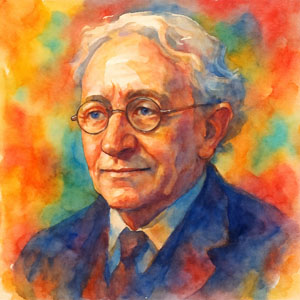~ James Whitcomb Riley
 “Hoosier Poet” and writer James Whitcomb Riley (1849–1916) was born on this day in the agricultural town of Greenfield, Indiana. The memories of his childhood and the powerful oratory skills of his father, a lawyer, would inspire his poetry.
“Hoosier Poet” and writer James Whitcomb Riley (1849–1916) was born on this day in the agricultural town of Greenfield, Indiana. The memories of his childhood and the powerful oratory skills of his father, a lawyer, would inspire his poetry.
“It is no use to grumble and complain,” he said. “It’s just as cheap and easy to rejoice; when God sorts out the weather and sends rain — why, rain’s my choice.”
Quitting law school, Riley took a number of odd jobs before writing humorous verses in the Indianapolis Journal (1877–1885), where he wrote many of his most famous poems. To capture the spirit of rural America, he relied on small-town dialect. “The ripest peach is highest on the tree,” he said.
His sentimental work was praised by Mark Twain as “fine and beautiful” art and celebrated for “genuine authenticity.” Audiences loved his optimistic, honest, and easy-to-read poems. “Riley speaks our tongue,” said Indiana state senator Albert J. Beveridge in 1908. “His works are the language of the people. He is the interpreter of the common heart.”
With lyrical charm, Riley carried his poems from the page to the stage, winning hearts with The Old Swimmin’ Hole and The Raggedy Man. His performances became cultural events, so beloved, in 1915 Indiana declared his birthday an official state holiday.
“Disregard all the pain you feel, and the disappointment,” Riley said. “Look to a better time … and have faith.” Persistence is not only strength, but nourishment for the heart.
 Carry your unwavering spark.
Carry your unwavering spark.
